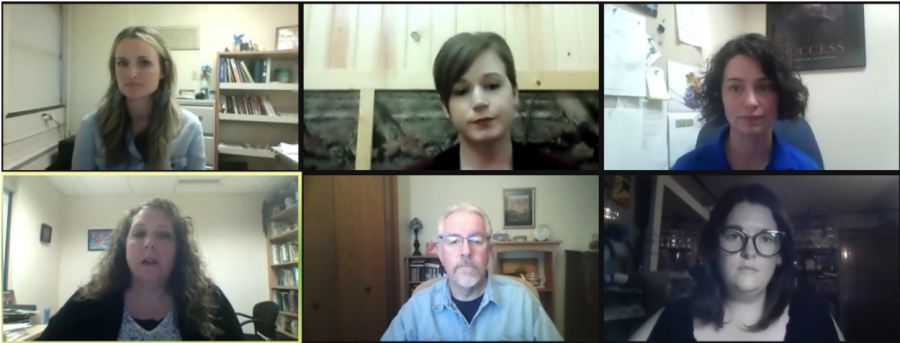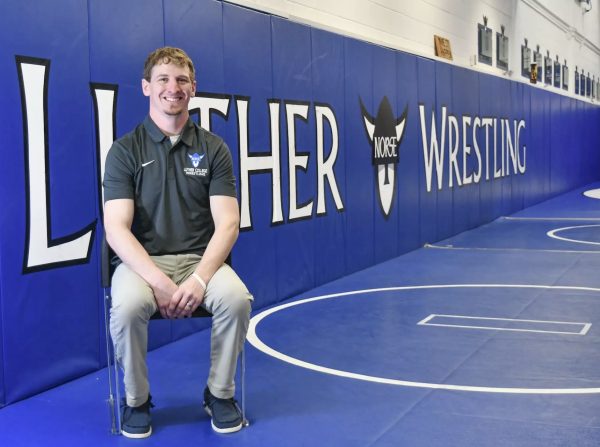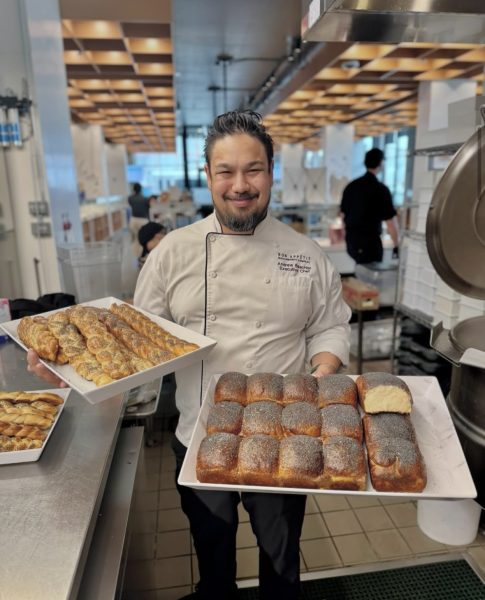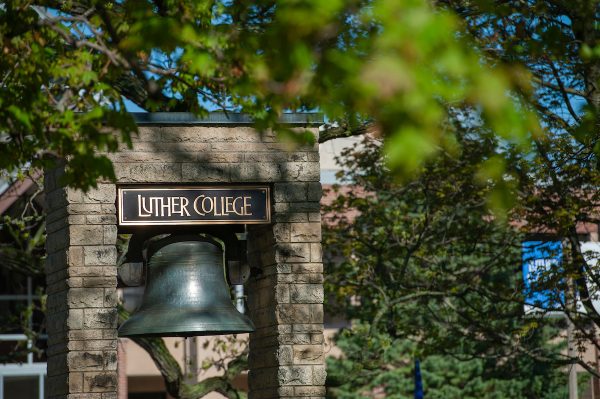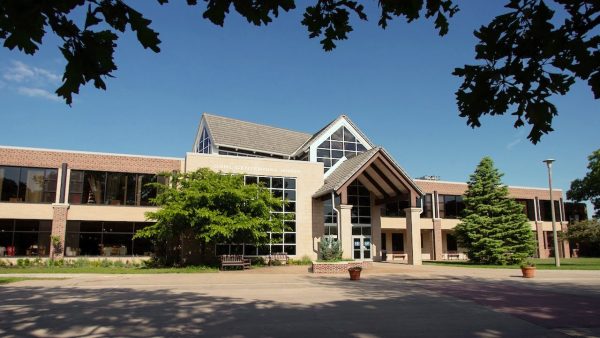CEPE et al. hosts “Responding to Sexual Violence at Luther College”
Top row left to right: Kasey Nikkell, Brittany McIntyre, Jessica Rupp, (bottom row left to right) Janet Hunter, Andy Eastwood, and Sarah Wennes led the event on sexual assault. (Photo courtesy of Ian Wriesner | Chips)
**Trigger Warning**: this article contains content related to sexual assault, sexual harrassment, and violence.
On Wednesday, April 28, the Luther Center for Ethics and Public Engagement hosted a conversation between Luther faculty members and staff from the Riverview Center and Helping Services for a panel titled “Responding to Sexual Violence at Luther College.” The panel was held over Zoom and was followed by a Q&A, with optional breakout rooms available afterward.
The panel was moderated by Associate Dean for Student Life Janet Hunter, and featured Associate Professor of Social Work Andrew Eastwood, Brittany McIntyre from Helping Services, Kasey Nikkel, Title IX coordinator at Luther College Jessica Rupp, Luther’s health promotion coordinator, and Sarah Wennes from the Riverview Center.
This panel acted as a follow-up to the recently conducted Campus Climate Survey, in which Nikkel walked attendees through the data and her fellow panelists provided resources and advice for anyone currently experiencing sexual violence. Eastwood used the data as a frame for his opening remarks, stating Luther students and faculty are called to disrupt systems of oppression and to think on the nature of resilience.
Rupp then gave attendees the tools to work toward that disruption, giving useful mnemonic devices on consent and bystander intervention. She told attendees to remember FRIES when giving or receiving consent (Freely given, Reversible, Informed, Enthusiastic, Specific).
While discussing consent, Rupp shared how she has seen the nature of consent being practiced in the way that students have been adapting to masking and social distancing.
“Many of the COVID policies have sparked conversation around personal boundaries and space,” Rupp said. “For example, roommates talking about their comfort with hosting guests in their rooms and whether those guests are masked or unmasked. While this isn’t sexual consent, these are examples of consent in practice.”
Bystander intervention was another important point in her presentation, along with a five step process to show attendees how to help others who may be in danger: (Notice, Interpret, Assume responsibility, Know how to help, Act).
Rupp also brought up the Green Dot program, which is being implemented at Luther. Green Dot is a course for college campuses that trains students and faculty in methods of bystander intervention. Training will start this May with faculty, and be extended to students in the fall of 2021. Nikkel detailed the program.
“[Green Dot] relies on the premise that if everyone does their small part and commits to individual responsibility, the combined effect is a safe campus culture that is intolerant of violence by using the 3 Ds: Direct, Delegate, Distract,” Nikkel said. “Green Dot intentionally starts the training with faculty and staff to assist with strategic planning specific to Luther and identifying peer influencers in the community.”
Wennes, a sexual assault advocate from Helping Services, told attendees about how a person’s reaction can be a factor in whether a survivor seeks help or closes off. She encouraged potential listeners to believe survivors, and to be open, attentive, and empathetic.
The Riverview Center also provides resources for those who are supporting survivors. According to McIntyre, both survivors of sexual abuse and those they choose to share their experiences with can meet with advocates for free at any place of their choosing.
Both Nikkel and Wennes made it clear that resources on campus and in the community are survivor-centric, and will not take any legal action without the consent of the survivor.
“Luther College supports the choices students make – whether or not to report, and to whom to report – and recognizes these choices are particularly difficult in some cases,” Nikkel said. “The Title IX office is going to honor the choice and agency of the complainant if and or when they want to proceed with a formal investigation, hearing and/or restorative practice to address the behavior through fair due process.”
The panelists hope that Wednesday’s discussion will get students thinking differently about their role in preventing sexual violence, and that which the community will play in making Luther a safer campus.
“I hope that the panel can serve as a springboard for thinking about how we can all respond to sexual violence on our campus,” Rupp said. “Every member of the community has a role to play, and I hope that this panel gave people a sense of how they could begin to engage, support survivors, and make the community safer.”
With all these resources laid out, and with increased opportunity for training coming to Luther, Nikkel hopes that students will make full use of them and be responsible bystanders and supporters.
“Often on a small campus, there is a variety of hearsay and rumors associated with these cases, and I would challenge students to consider if the information is respectful, true, and helpful,” Nikkel said. “I encourage any students that have concerns or questions about resources, policy, or response to come directly to the Title IX office. The Title IX office believes strongly in continual improvement and wants to hear the concerns of our students and the Luther community.”
Assistant Director of the CEPE Krista Holland, who organized the panel, hopes to see a more active and protecting campus with the many tools and resources available to students and supporters.
“Having a pro-active approach to preventing sexual violence is ideal, also knowing how to support survivors is critical too,” Holland said. “The panel participants provided tips and highlighted the support that is available on campus and in the community. The CEPE was grateful for everyone’s participation.”
For those who missed the event, a full recording is available on the Luther College Center for Ethics YouTube page.

